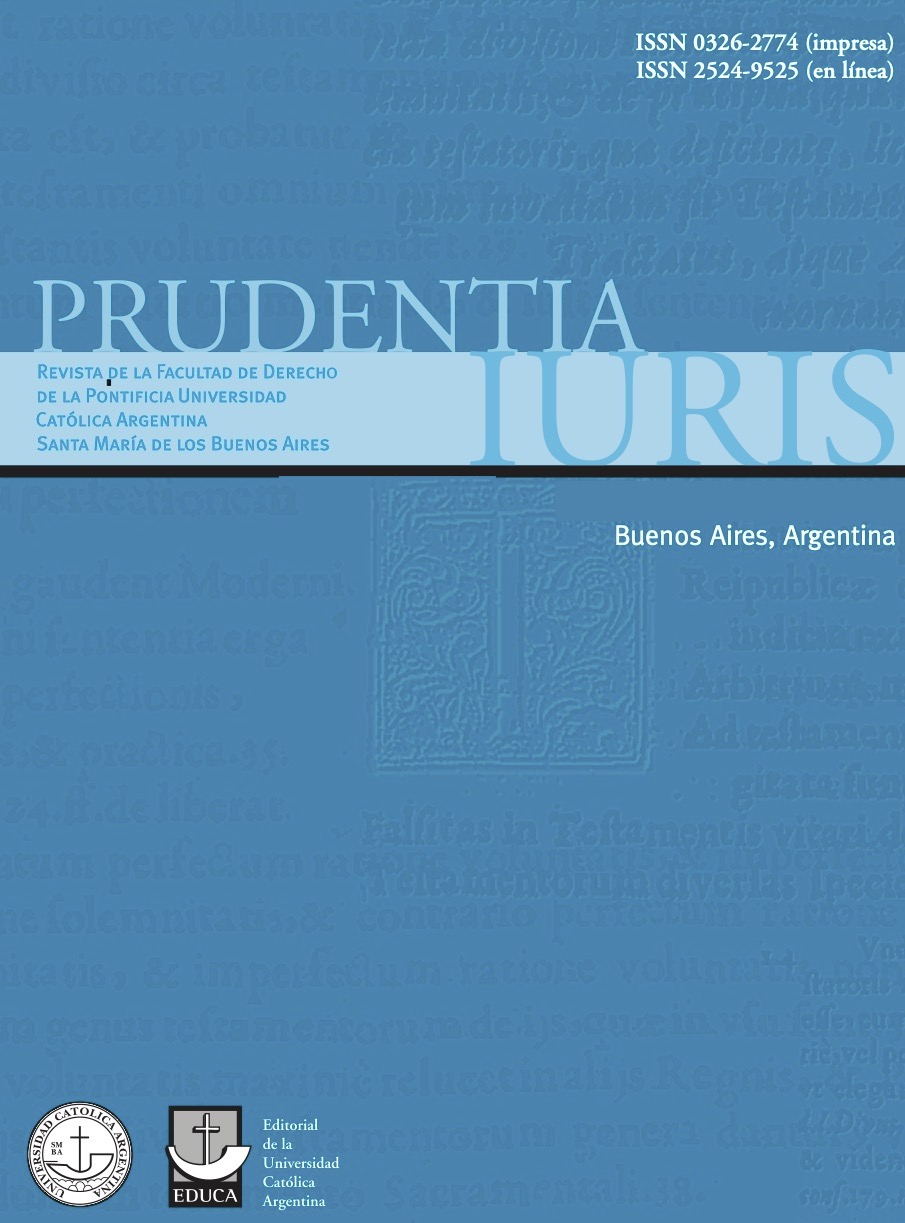POSITIVISM AND NATURAL LAW REVISITED
DOI:
https://doi.org/10.46553/prudentia.98.2024.1Palavras-chave:
Derecho natural, John FinnisResumo
March 2012 marked the time of my first of many visits from Argentina to the Notre Dame campus for purposes of teaching a mini-course at the Law School. In those days, Professor John Finnis used to come to South Bend forjust a few weeks of the Spring Semester, to teach a one-credit short course on Shakespeare. In 2012, as well as in several subsequent years, I timed my visits so as to overlap with this Spring visit of his. One night, over dinner, he told me that immediately before arriving in America he had been in Italy, where he had delivered a paper on Pope Benedict XVI’s speech at the Bundestag, in Berlin. When I was tasked by the Center for Ethics and Culture to comment, all these years later, on that Berlin speech, my mind went straight to thememory of that dinner.
Downloads
Referências
Finnis also came regularly to the Notre Dame Law School each Fall Semester, to teach a semester-long two-credit course/class on the moral, political, and legal thought of Thomas Aquinas.
John Finnis, “Benedict XVI’s Address to the Bundestag and the Sources of Knowledge for Ethics and Law”, address to the Centro di Cultura, Milan, 9 March 2012, unpublished manuscript on file with the author. All references to Finnis are to this source unless otherwise noted.
Benedict XVI, Bundestag Speech at.
Benedict XVI, Bundestag Speech at. Sometimes the exclusion referred to by the Pope is produced via the assimilation of ethical reason to religion. MacIntyre explains, along those lines, that for the modern mind natural law is akin to theological superstition. Alasdair MacIntyre, After Virtue 34 (Notre Dame Press, 2007).
As Finnis puts it, logical positivism presupposes “the assumption that the methods of science –Baconian, experimental, and mathematicized natural science– are the only human ways to truth and knowledge, the only truly objective ways of thinking”. Finnis, 1.
Finnis, 1-2.
Benedict XVI, Bundestag Speech at.
Finnis remarks: “Since this embarrassing collapse [of logical positivism], few philosophers in the English-speaking world have wished to think of themselves as positivists, and today we speak more often of scientism –of theses or assumptions that are scientistic (as distinct from scientific) because they assume that outside natural science there are nothing but subjective assertions and beliefs, corresponding to nothing objective ‘in the universe’. The Roman Law scholar whose book the Bundestag address cites several times uses the term ‘scientistic’, in the cited pages, as equivalent to ‘positivist’. But people who hold these sceptical assumptions or theses do not, of course, describe their own position as scientistic or scientism; more commonly, they would today call it naturalism”. Finnis, 2, emphasis added.
Finnis, 2.
On the relativism and skepticism of most sophists, see generally, R.E. Allen, The Dialogues of Plato (New Haven: Yale University Press, 1984) and Stanford Encyclopedia of Philosophy, s.v. “The Sophists”, in https://plato.stanford.edu/entries/sophists/
Finnis, 4.
In the context of the philosophy of law “positivism” often means something different from what Pope Benedict XVI means in his speech. See e.g. Timothy Endicott, “Raz on Gaps – the Surprising Part”, in Rights, Culture, and the Law. Themes from the Legal and Political Philosophy of Joseph Raz, L. H. Meyer, S. L. Paulson y T.W. Pogge (eds.) (Oxford University Press: Oxford, 2003), 100 (stating that he does not know what legal positivism currently means and posing the rhetorical question whether legal positivism does even exist). In the same book featuring Endicott’s piece, Raz (in whose honor the book was published) expresses his agreement, and repents of having on occasion adopted the label “[legal] positivist”. Similarly, Finnis wrote in the same year in which Raz’s festschrift came out that “it is a mistake to talk about positivism at all. I have been trying for decades not to do this sort of thing, and I repent for having done it. […] Better to think: there’s no such thing as [legal] positivism”. John Finnis, Law and What I Truly Should Decide, 48 Am. J. Juris. 107 (2003), 127.
Finnis, 3.
Guidance and “oughtness” can also flow (and flow) from religious norms and standards. For examples, see Santiago Legarre, A New Natural Law Reading of the Constitution, 78 La. L. Rev. 877, 881-883 (2018).
Finnis, 4.
Finnis, 4-5. Finnis shows in his Milan address that Kelsen had already held this skeptical view about natural law in his early work but also that this trend got worse (and got extended to positive normativity) in the late production of his final years. See especially, Hans Kelsen, General Theory of Norms (1979).
Kelsen’s essay collection What is Justice?, was originally published in California in 1957 DOI: https://doi.org/10.1525/9780520311336
Unsurprisingly given their relativism and skepticism, the Sophists too rejected the normativity of natural law. They were famously refuted by Socrates. As Finnis explains, “Socrates/Plato transforms the Calliclean opposition between nature (physis) and law/convention (nomos) into the recognition of a natural law –the set of propositions which pick out (i) the goods (such as knowledge and friendship) to be pursued and (ii) the principles of reasonableness in realizing goods in the life of oneself and one’s fellows– the principles of justice and the other virtues”. John Finnis, Natural Law and the Ethics of Discourse, 43 Am. J. Juris. 53, 62, footnote omitted.
Thomas Aquinas, Summa Theologiae I-II, 95, 2 c. See generally Santiago Legarre, Derivation of Positive from Natural Law Revisited, 57 Am. J. Juris. 103-110 (2012) (discussing the different connections between natural and positive law). DOI: https://doi.org/10.1093/ajj/57.1.103
Finnis, 5.
See Thomas Aquinas, Summa Theologiae I-II, 94, 2 c.
We should add that each of the first principles of natural law comes under an even more general and abstract principle: “[…] the absolutely first principle of practical reason: Good is to be [ought to be] pursued and done (and evil avoided)”. Finnis, 9; and see Thomas Aquinas, Summa Theologiae I-II, 94, 2 c.
Finnis, 5.
Finnis, 6.
“Pre-moral”: Finnis’s word back in 1980: John Finnis, Natural Law and Natural Rights (Oxford Univ. Press, 2011), 86; 101 (1980).
Chapter II of Finnis’s Natural Law and Natural Rights is tellingly titled “Images and Objections”. See id.
Cristóbal Orrego, The Relevance of the Central Natural Law Tradition for Cross-Cultural Comparison, 8 J. COMP. L. 26, 32 (2014). Along similar lines, MacIntyre tellingly described natural law as the acceptance of “the objective value of human reason and the objectivity of what is good or evil regarding at least certain things that are basic human goods for all persons, regardless of time or culture”. Alasdair MacIntyre, After Virtue 34 (Notre Dame Press, 2007).
Finnis, 6.
For some years Finnis too had called them “basic values”. John Finnis, Natural Law and Natural Rights, cit., 59.
The first principles only become fully moral “when we take into account the fact that we have to choose between this intrinsic good (and different possible instances of it) and different intrinsic goods”. Finnis, 5. The same is true of the other “first principles”, alluded to by Thomas Aquinas, Summa Theologiae I-II, 94, 2 c. And see John Finnis, Aquinas: Moral, Political, and Legal Theory (Oxford Univ. Press, 1998), 86-90.
John Finnis, Natural Law and Natural Rights, cit., Chapters III-IV. Neil Gorsuch refers to the basic goods as follows: “[…] there are certain irreducible and categorical moral goods and evils. The existence of such moral absolutes has been suggested by Aristotle, argued by Aquinas, and defended by contemporary natural law thinkers”. Neil M. Gorsuch, “The Right to Assisted Suicide and Euthanasia”, 23 Harv. J.L. & Pub. Pol’y 599, 697-698 (2000) (footnotes omitted). This wording is much less precise than Finnis’s (as is perhaps to be expected), and runs together what Finnis keeps distinct; but given that its author is now a Justice of the Supreme Court of the United States it is worth recalling his words for the record, given their commendable general drift.
Finnis, 9.
In his 2012 address, Finnis reminds us of the Thomistic teaching that “these first principles do not follow from any other truth; they are all […] per se nota, and indemonstrabilia. They are each understood, without inference from any other proposition, by an act of original insight into data, the data which we are aware of as possibilities in which we have an interest”. Finnis, 9.
Christopher L. M. Eisgruber, Justice Story, Slavery, and the Natural Law Foundations of American Constitutionalism, 55 U. Chi. L. Rev. 319, n. 114 (1988). DOI: https://doi.org/10.2307/1599775
Thomas Aquinas, Summa Theologiae I-II, q. 94, 4 c. This happens either as a result of simple error in the reasoning process from general principles to specific precepts or due to one’s own vices. Thomas Aquinas, Summa Theologiae I-II, q. 94, 4 c; q. 94, 6 c.
To stress the notion that natural law does not require faith, when I teach Jurisprudence I tell my students that natural law is “the religion of the atheist” –an idea quite in line with Saint Paul’s words to the Roman pagans: even though they did not have the revealed religion, they “still through their own innate sense [that is, natural law] behave as the [Jewish] Law commands […] They can demonstrate the effect of the [natural] Law engraved on their hearts, to which their own conscience bears witness”. Romans 2,14-15 (New Jerusalem Bible).
Thomas Aquinas, Summa Theologiae I-II, 95, 2 c. See generally Santiago Legarre, Derivation of Positive from Natural Law Revisited, cit.
Downloads
Publicado
Como Citar
Edição
Secção
Licença
Direitos de Autor (c) 2024 Santiago Legarre

Este trabalho encontra-se publicado com a Licença Internacional Creative Commons Atribuição-NãoComercial-CompartilhaIgual 4.0.
















